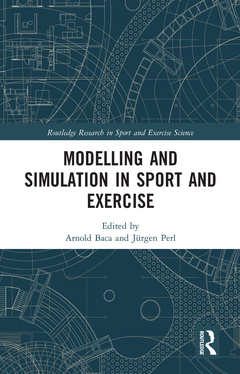Description
Modelling and Simulation in Sport and Exercise
Routledge Research in Sport and Exercise Science Series
Coordinators: Baca Arnold, Perl Jürgen
Language: English
Keywords
Voronoi Cells; Winner Neuron; Arnold Baca; Tactical Patterns; betting; Tactical Behavior; biomechanics; Prosthetic Foot; computer science; Force Velocity Relation; designing prosthetics; Team Handball; Jürgen Perl; Dorsal Splint; lactate kinetics; IR Model; modelling; Backward Fall; modelling and simulation in basketball; Hr Variability; modelling and simulation in football; Discriminant Score; modelling and simulation in handball; Training Load; modelling success; Myosin Heads; motor behaviour; KPI Value; muscle mechanics; HDP; physiology; Rowing Technique; shoe design; Qualifying Tournament; simulation; Provide Decision Support Information; ski design; FEA Model; sports equipment; Defensive Rebounds; Josef Wiemeyer; Oar Blade; Sigrid Thaller; Wrist Extension; Harald Penasso; Hill’s Equation; Michał Wychowański; ANSYS Workbench; Daniel Memmert; Markus Tilp; Jaime Sampaio; Bruno Gonçalves; Nuno Mateus; Zhang Shaoliang; Nuno Leite; Peter O'Donoghue; Stefan Endler; Christian Rasche; Mark Pfeiffer; Veit Senner; Stefan Lehner; Frank I; Michel; Othmar Brügger; Felix Starker; Eric Nickel; Andrew Hansen
Publication date: 06-2020
· 15.6x23.4 cm · Paperback
Publication date: 09-2018
· 15.6x23.4 cm · Hardback
Description
/li>Contents
/li>Readership
/li>Biography
/li>
Modelling and simulation techniques are of central importance to conducting research in sport and exercise science, informing data collection and helping to analyze patterns of movement and physical performance. Modelling and Simulation in Sport and Exercise is the first book to offer an instructive reference for modelling and simulation methods for researchers and sport and exercise scientists.
Based around a series of research cases, describing core theories in applied, practical settings, the book draws on examples of modelling and simulation in ball games, biomechanical analysis, physiological testing and monitoring, predictive analysis and sports engineering and product design. Each research case presents a central problem, discusses different modelling approaches that could be used to deal with the issue, analysis of results and a reflection on the methodology and an exercise for students to put the techniques discussed into practice.
This is an important reference for any active researcher or upper-level student in sport and exercise science with an interest in mathematical modelling, computer science or simulation techniques.
Part I: Aspects of Human and Sports Motion
1. Motor Activity: Motor Control and Learning
2. Muscle Mechanics
3. Rowing
Part II: Team Sports and the Modelling of Playing Processes and Tactical Behaviour
4. Soccer: Process and Interaction
5. Modelling in the Analysis of Tactical Behaviour in Team Handball
6. Basketball
Part III: Evaluation Concepts and Techniques
7. Tournaments
8. Key Performance Indicators
Part IV: Physiological Conditions of Being Successful
9. Marathon
10. Training
Part V: Tools and Equipment Used in Sport
11. Modeling and Simulations to Prevent Overloads in Snowboarding
12. Methods to Gather Key Performance Indicators for Prosthetic Feet
Arnold Baca is head of the Section of Biomechanics, Kinesiology and Applied Computer Science in the Department of Sport Science at the University of Vienna, Austria
Jürgen Perl is a Professor Emeritus in the Institute of Computer Science at the University of Mainz, Germany




